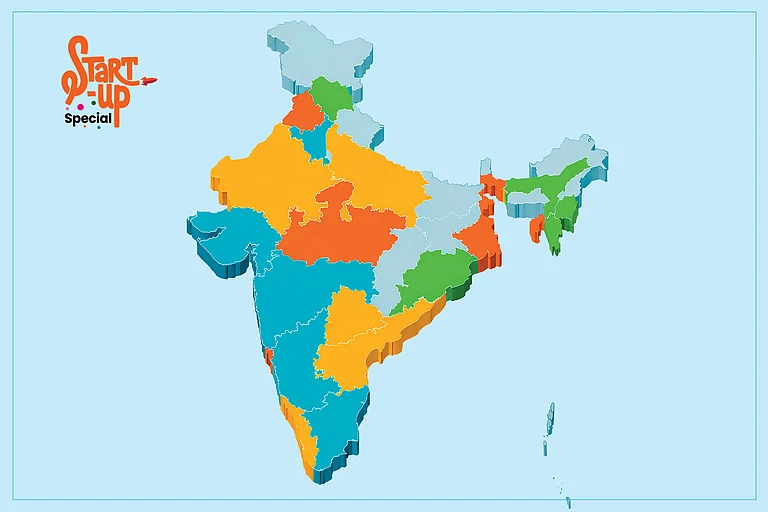A general consensus among start-ups working on quantum computing has been the lack of VC interest in the area. Start-ups have argued that while India is late in the quantum computing area, the country has lot of advantages in terms of its talent pool. However, success can happen only when there is increased interest by investors.
Just to simplify, a quantum computer helps perform complex calculations exponentially faster for specific tasks. A quantum computer uses special rules from quantum physics to process information. Instead of regular bits (which are either 0 or 1), it uses qubits, which can be in many states at once. They can be used in many fields, including grub discovery, cybersecurity, machine learning, and more.
The number of funding rounds for quantum computing start-ups in India has been as high as 6 as of November this year as compared to 2 in 2017, as per data platform Tracxn. The number has been mostly single-digit, ranging from 2 in 2017 to 4 in 2023. Similarly, Tracxn's data highlights that the funding round was $1.32 million in 2018 and $12.2 million in 2024 as of now. While this is a rise, it is relatively low.
Speaking about the same, Nikhil Mitaliya, founder of quantum computing start-up S-Qube Systems, said that VCs typically expect a return on investment (ROI) within 2 years, but this may take longer in some cases. “They often lack the patience to wait for extended periods. Another challenge is that VCs usually require some level of sales or traction, which can be a distant milestone for many start-ups,” added Mitaliya.
Mitaliya’s company focuses on the control electronics aspect of quantum computing. The company also partnered with Israeli company Tabor Electronics to focus on hardware development.
Mitaliya’s company began developing applications for quantum computing, such as those related to NMR (Nuclear Magnetic Resonance), and later expanded to work on superconducting qubits. By the end of 2022, they began focusing on core R&D, using existing hardware and developing software, firmware, and applications to enable these systems to perform desired tasks.
One area where Mitaliya feels that the country faces significant challenges is regarding hardware imports.
“For example, we import some of our hardware from Israel. If we could design and produce these components locally in India, it would be significantly cheaper. However, hardware design is a complex process and could take up to two years to develop,” he added. The company currently claims to pay 30 to 40 per cent more than they would if the components were produced locally, which adds to the overall cost.
Manan Narang, chief executive officer of quantum start-up Silico Feller that develops quantum chips, claims to be working towards manufacturing chips in India while also exploring the possibility of exporting them internationally. This is a relatively new initiative, as most quantum computing companies in India currently rely on importing chips, added Narang.
As per trade data platform offers export-import trade intelligence Volza, the top three importers of Quantum include India, Taiwan, and the Philippines. From March 2023 to February 2024, India topped global quantum imports with 40,732 shipments, followed by Taiwan with 10,412 shipments, and the Philippines in third place with 9,317 shipments. Narang further added that quantum computers are made up of three parts, including control systems, conductive wires, and dilution refrigerators. All three of these parts are imported from various countries.
Another area of concern has been the infrastructure gap in the country, add experts. “Our research team is largely based outside of India, with some members in Europe and the US, primarily due to the infrastructure gap in India. However, we are now seeing more resources emerging in India, which is helping to fill that gap,” added Narang.
To address this, the company is now considering collaborations with research institutes in India, such as IIT Bombay for fabrication and IIT BHU for chip design, he added. In India, quantum computing research and development has been lagging. As a result, the number of patents with regards to quantum computers is reportedly 339 patents. This is way behind China with 23,335 patents.
While there is a gap, things don’t look dull for India, add experts. The National Quantum Mission announced by the government was a big boost for the ecosystem. The Rs 6,000 crore mission announced in 2023 aims to “seed, nurture, and scale up scientific and industrial R&D and create a vibrant and innovative ecosystem in quantum technology (QT).”
The government is also planning to collaborate with corporations such as TCS, HCL, and IBM in this regard. "IBM is already working closely with teams in India, particularly through the National Quantum Mission, where we aim to bring both technology and expertise to collaborate with Indian start-ups and the broader Indian ecosystem to build quantum computers,” said Rohit Sood, Data & AI Pre-Sales Engineering Leader, IBM Quantum Ambassador, IBM Technology, India/South Asia. The team is collaborating with the Indian government on three key areas: the quantum mission, AI, and semiconductors.
So, what’s the way forward for quantum start-ups now? Experts have echoed the significance of the government-first approach. To simplify, this is an approach where the government is the first buyer of the product.
“It’s essential that the government first places orders with Indian start-ups before turning to international suppliers. This approach would not only provide much-needed funding for start-ups but also valuable feedback from researchers and industry experts, which could help refine products,” added Mitaliya.
Speaking about deep tech start-ups, India’s G20 Sherpa and former NITI Ayog CEO Amitabh Kant said at an event in New Delhi recently that the government should focus on two things: creating a fund of funds and launching large-scale challenges that address India's critical needs.
Kant further highlighted that due diligence is something that cannot be carried out by the government. “It should be the responsibility of VC funds. The VCs should contribute two-thirds of the funding, while the remaining one-third can be driven by a fund of funds,” he added. With increasing focus by both the government and corporations on quantum computing, it will be interesting to see how the landscape as a whole evolves in India.
































